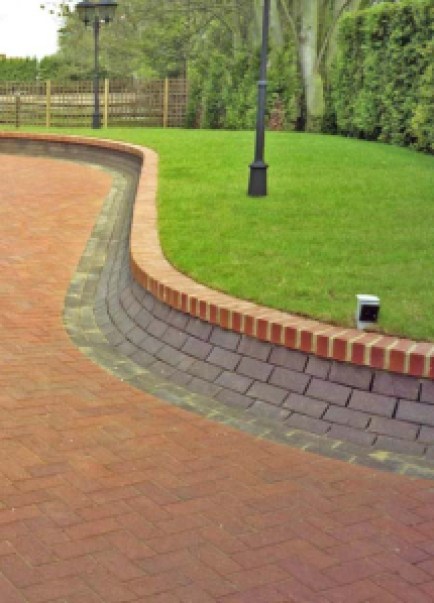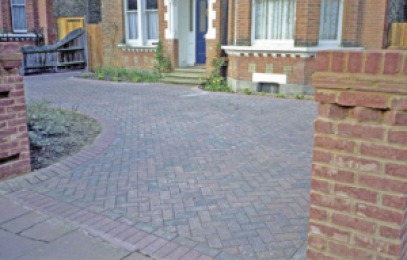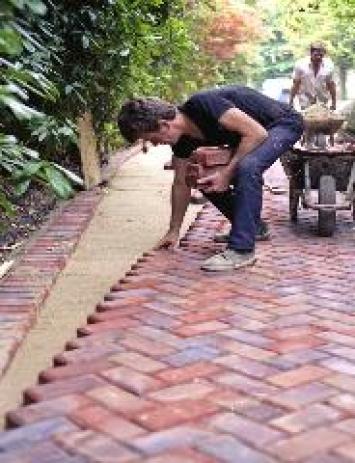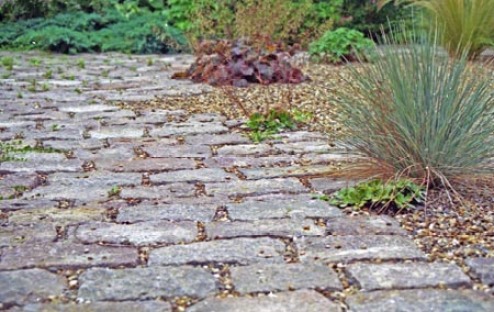-
Are you thinking of moving?
Are you looking to Buy or Sell a home in the Greater Kansas City Metro Area ?
I’m a licensed Realtor in Kansas & Missouri with

Wingman Real Estate Associates
KW Partners Inc
6850 College Blvd
Overland Park, KS
Each office is Independently owned & Operated
Hello, I’m Chris,

A little about me,
I’ve always strived to be just a little different.
Over the years this approach has enabled me to embrace a varied and really fulfilling work environment.
Exploring many areas and seeing a huge variety of places. At the same time meeting many fascinating people from all walks of life.
I’ve enjoyed every moment, gaining much insight into the ways of clients and the world.
Providing me with a huge amount of experience. Working with thousands of homeowners over almost 50 years.
More Importantly, I’ve found that patience, attention to detail with regular contact helps the process of buying and selling homes.
Please reach out call or text me at 816 813 0729
or just take a look at properties that are available now , visit – My website
My early days:
On leaving school my first job was as a junior sales assistant to the assistant of the Commercial Partner in a large local Real Estate firm with five offices. In my then, home town of Reading, England.
It was a busy fun place to work, with a great team of around 30 or so professionals specialising in Country Homes, Rural Estates, Shops & Offices, Rural Land and Antique sales.
It didn’t take long to learn a huge amount, showing homes, offices, shops and industrial complexes – I recall spending a few days chain surveying a now extremely famous rock stars new estate.
On another occasion we valued an entire aerodrome – now a large business park.
The company used to manage estates for the rich and famous, one of my jobs was to keep the ‘Gun Book’ for Sir Charles Clores, Stype Estate. The pheasants were then sent on to Selfridges his London department store – It seemed earning how to write in Italics had its benefits!
Amenity Horticulture
After a year or so, I was introduced to the newly developing industry of Commercial Amenity Horticulture – a cross between Architecture, Landscape Architecture, Construction Management, Surveying and Horticulture.
I decided to spend the next four years learning more. It was a great decision at the time.
Four years training for a degree. Then working for a large parks department in London. After a few years forming our own company in London.
External Design & Build
A cross between Landscape Architecture & Construction Management was just making an impact on cities it was an exciting time. My three partners and I soon discovered that our knowledge and training gave us a huge advantage over our competitors.
We won many awards, as I recall around 18, were given fabulous projects to carry out, learned an incredible amount about design, engineering, construction and project management.
Here are just a few examples of our work.

The drive surface above is a combination of fiberglass mixed with dried p-shingle, the edging is a triple brick gulley
 A more traditional dry-lay brick drive.
A more traditional dry-lay brick drive.Working in London
I trained and employed truly superb craftsmen.
 Designed and built both of these executive residences landscapes.
Designed and built both of these executive residences landscapes.These pictures show how the properties have matured after 25 years.

A natural brick & stone terrace
Landscape features.
We had fun designing and building features for each garden landscape.
 Here, a simple pergola.
Here, a simple pergola. Here a Mediterranean dry landscape – no grass
Here a Mediterranean dry landscape – no grassHere’s a small selection of projects over the years, with many thanks to all the wonderful staff that were part of the team that enabled us to carry out such lovely work for our clients.
I’ve added some of my work and hobbies, to give a more fuller idea about me, such as writing children’s books, conducting Interviews around the world for our Growing Trends podcast.
A whole host of landscape ideas ( some might be of interest to you) that we employed or invented for homes, roof gardens, children’s playgrounds, hospitals, parks and streets – collecting both awards and industrial patents along the way.
Sailing.

My relaxing passion is sailing – that’s not me hanging over the rails, its the sailboat in front trying to keep us behind them in a race !
I’ve been sailing since the age of 8. I learned on an English lake in a 10ft 6 inch Cadet like the one below. We actually made one in plywood as a woodworking project at school when I was 11.

Example of Cadet sailing Today my wife Cindi and I have a Catalina Capri 25 and a Catalina 28

Stiletto our Racing Capri 25 
“Quinley” our relaxing Catalina 28 
Tuning the new sails 
Trying out the new sails Sailing is one of the most relaxing, thought provoking, physically exhausting and challenging pastimes one could have. It teaches you to focus 100% on the task at hand.
Which conveniently leads me to how I approach Real Estate.

Hopefully you will allow me to help you discover your dream home or assist you selling a property, or just give you an idea or two.
I would very much like to help you with your home sale or search for a new home.
I’m here to help you.
If you are looking for a Real Estate Agent licensed in the Kansas City Metro and Surrounding Area and most importantly not already signed with another agent.
Please consider contacting me. A simple text to 816 813 0729 will get us started.
Are you looking for someone that has the time to provide you with a professional service?

I am someone who is willing to spend the time helping you sell your home or buying your next dream home?

If you prefer to email : chrisdysoncoope@kw.com
Let’s begin the journey to find your dream home or sell your property today!
Contents of the website.
The additional sections within this website, of which there are many, include a series of fascinating interviews, from some very special experts across the world.
I’m happy to answer any questions on any of the articles on landscaping, just drop me a line to get started. – chris@chriscoope.com
Thank you for stopping by,
Chris.
Realtor® with Wingman Real Estate Associates. KW Partners Inc – Each office is Independently owned & Operated
If you would like to sign up, I will periodically send you articles relating to homes.
© Chris Coope LLC.
Views: 77
-
Creating mystery & intrigue with Timber Walls, Fences & Trelliage
Last time we talked about paths.
Today I thought it might be advantageous to discuss ‘Timber Walls & Fences’.
We will include Trelliage as they all have a role to play.
Helping to create a certain kind of mystery within a garden landscape.
We’ve discussed hedges recently, so you can scroll down to that article if you would like.
These ‘vertical materials’ are acting as a visual or physical barrier between differing areas.
This leads the eye on to a new discovery or perhaps just creating an interesting space.
At some time fairly soon we should add ‘Green Walls’ which are gaining in interest and can look absolutely superb.
I wonder how long it is before we develop these to grow vertical edibles ?
Having designed and built a huge number of gardens over the years. We have gained valuable experience in what works best in a given situation.
Using Timber.
The garden below, was primarily designed to reduce aftercare. Taking care to keep the beautifully rustic boundary fencing, which blends in to both the surroundings and the new work so well.
It was necessary, to repair the odd arris rail, a couple of fence posts and some slats, re-hang the side gate etc. Overall by keeping the original fence the rustic feel was, I think, you will agree maintained.

Low hit and miss side fence with 6ft feather edged boundary fence & framed gate Start with what is already there.
It’s nearly always best to work with what is already there, rather than ripping out everything. My first task is always to look up and see how the tree canopy is. Then beyond the space we are working with.
To see what impact, we may be making without perhaps realizing how a neighbor might view our endeavors.
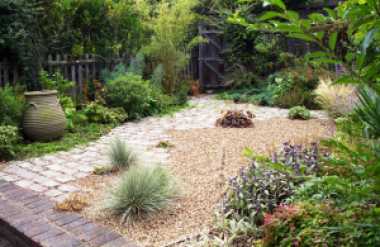
Very low maintenance, Mediterranean style In small gardens complete barriers tend to make the garden smaller. It is best to create more of an illusion of a barrier. This is often best created by using trellis. Here is an example that we stained black.
A word of warning, trying to make a gate from trellis is fraught with problems if you do not add a full frame that is braced. When you add this, it tends to upset the look of the trellis, so think carefully before using as a gate. As without the frame the gate will change shape over time!
Trelliage
The trellis here was primarily to separate the more formal ‘Front Garden’ with the more relaxed ‘Play Garden’ at the rear and side of the property.
To improve the strength of this gate we added metal framing at each corner, both inside and outside, it was only partially successful.

A black stained trellis gate If a more substantial barrier is required, say in the form of a structural wall to hold back a bank then there are a number of ways to achieve this.
Low Timber Retaining wall.
Here we used vertically set timber as a retaining wall. We did place a waterproof membrane behind the timber and a gravel pressure release drain. So as not to have unsightly stains running across the light colored paving.

Low timber retaining wall A quite pleasing effect can be achieved.

The softer low timber wall looks at home here. Roof Gardens
Roof gardens benefit from the light weight of timber. Its ability to be ‘modulised’, as can be seen here.

Low timber walls on roof garden Structural Timber Walls
Some years ago, now, we discovered. Well perhaps I should say a local native of our area wanted someone to test a new product he had found lurking in New Zealand. So, as we had won a number of awards for our work, and our teams were well known, he persuaded us to try this product.

Structural Timber Walls It was fantastic. Ok I should add some provisos, it is treated wood, it lasts a very long time, I have pieces from 30 years ago that are still unblemished. Maybe bleached a little but otherwise fine. It will twist if not constructed correctly, although it is unzippable and thus fairly straightforward to repair. If you introduce plants into the wall, it looks amazing. Infact the plants protect the timber.
Here’s a much taller one we completed.
It is essential to use a structural engineer to carry out the necessary survey, and calculate the design criteria for these ‘Gravity Walls.’
Once established they can look like this..

Planting covering a timber wall 
The timber wall blends in so well Some years back we were even asked to build a play area within a timber stockade. The posts were about 16 ft long and required some ingenuity to place correctly.

Treated timber barrier in play area Here’s how we did it..
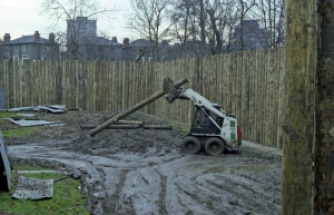
Using a 4in1 bucket on a bobcat Moving to more decorative uses, let’s explore trelliage and low walls..

Wishing well feature with trellis back drop We sometimes add some whimsy to our designs. Here we used a rather deep drainage shaft, disguising it as a wishing well. To make it stand out we added a trellis surround to enable us to plant climbers to enhance the visual impact. Here its just been completed.

Pergola with Wishing Well at end of path Ornamental Trelliage
Here we used a cloud trellis to add some movement to the landscape. To help hide the boring stepped trellis in the neighboring garden.

Cloud trellis adds movement Here the trellis has been painted white next to the house it gives a very clean look.

Painting trellis white adds interest Here we had a custom-made heavy-duty trellis, note the pencil edges soften the whole fence.

Superb detail for trellis 
The completed trellis barrier Ann & I will spend a little time on the radio show talking about materials. When we interview our next guests who will be Designers.
In the meantime, do come and listen at Growing Trends
We would love to hear from you with ideas, comments, suggestions and requests…
Ann & Chris
Views: 323
-
Dri-lay Drives
Dry – Lay Drives

We developed ‘Designer Drives’ almost 30 years ago..
How it all started..
My partners and I had worked for a London Parks Department. On some of the projects we were working on, we needed to use a strong paving material. At the time Marshalls( one of our suppliers) were testing a product called ‘Monolok’. It had been developed in Europe for use at bus stops. To prevent the heavy buses sinking into the tarmac, on hot days. These ‘monolok’ blocks were of differing sizes and worse ‘z’ shaped. This made them a nightmare to design with.
They were though, a really clever idea. They interlocked together, without using mortar, this effectively meant they stayed in position, didn’t crack or sink, but could be ‘unzipped’ and then relayed – if say a pipe needed working on below.
One day our sales contact rushed in with some new ‘brick-shaped’ grey blocks. He told us red would also be available soon. Did we want to try them? We immediately saw an opportunity. Using traditional bricks with a mortar bed required a heavy-duty brick version, worse it took days to point … see below.
This particular in and out brick driveway took 10 man-days just to point the bricks. Whereas the drive below took 4 hours to ‘sand in’ with kiln-dried silica sand.
Saving so much time, significantly increasing our profits on each project. We were soon demanding new, more interesting colours.. here’s one using a brindle colour mix..
New methods.
It didn’t take us long to refine our own techniques. Adding our own recessed manhole covers. Canting the edges so homeowners knew where they were as they drove around their driveway. – The slightly raised edge looked great visually as well. Setting us apart from our competition.
Here a well constructed and cut in recessed cover… this time using a softer stock brick.
When well done it’s very hard to see the recessed cover, as in this picture.. there are two in the lower picture!
New layout pattern
We soon added a ‘fish- scale’ pattern using granite setts. Then a phorphery sett to our ‘Designer’ collection..
Here’s some granite…much more expensive but they look superb !
When using ‘natural’ products. Such as the granite and real bricks it is important to remember that they are often differing sizes. This means that it is very easy to lose the design module. If you have too big an area its important to have adequate changes in direction.
The stock bricks below work for about a length of 1.8m ( 6ft). Then you need to add a break line or the pattern will start to wander off.
Below is a combination of natural granite setts and softer stock bricks – my favorite by far!

Would you like to read more Landscape projects ? – More Award winning projects
We would love to hear your thoughts and comments
Views: 842
-
Green Roof
Green Roofs
We soon discovered that the modular layout of the green walls worked superbly for Green roofs.
So in 1994 we designed and built this award winning Green Roof in central London.

Wooden pathway on Roof Garden Views: 327
-
Privacy Planting a Garden Hedge
Garden Hedges,
Hedges are often used to create a boundary between sections of gardens. They can help lead you around a garden. Although often their primary role is to act as a privacy barrier. A hedge can be a very useful garden tool.
Personally, we’ve even used ones for security. BY choosing a suitably thorny subject, it can make it impossible for someone or something to get through the branches.
The picture below, shows a hedge being used as an entrance into a garden, creating some privacy and yet leading the eye to the main terrace doors.
A hedge can be grown using almost any plant material that will withstand constant clipping. The list of suitable plants is quite large. At the smaller end you have the traditional box hedging often used in kitchen gardens, or to surround ornamental flower beds, as seen below.
Types of Plants to use.
To create a less formal barrier, you could use forsythia – but remember that forsythia flowers on last year’s wood. So pruning and shaping should be restricted to just after flowering if possible. Hornbeam, Beech, Rose, Escallonia, Cotoneaster, Laurel, Yew, Leylandii, Thuja all make a nice hedge.

Of course the height you desire the hedge, makes a difference in choice of plants to use as well.
Heights of hedges.
The height is also dictated by how often and by what method is used to keep the hedge clipped. As can be seen below, this hedge would take many hours of work to keep it in this condition.
Trimming a hedge can be a simple job, with a handheld trimmer or a more serious project with lots big of equipment.


Clearing away the cuttings Views: 348
-
Outside Home Check List
Outside Home Check List
After starting my Real Estate career in England in 1971.
I left for 25 years to development a multi award winning External Works Design & Build Company in London.
Residential Properties
Part of this was spent designing & building high end landscapes on residential properties in Southern England.
We developed an initial review list of what to look for when considering the potential for properties, along with expected on going aftercare.
Our construction teams focused on detailed hard & soft landscaping.
Developing new ‘Designer Drives’ using a ‘drylay’ system with block, brick and granite materials as early as 1982.

Natural brick & granite 
Natural Engineering Brick Dive, in herring bone pattern 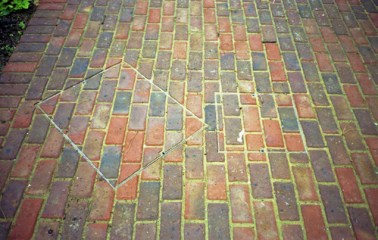
Recessed manhole access covers cut into drylay brick paving Can you see the second manhole cover ?

Canted block edge that leads the eye around the design.
Practically to let a driver know they were nearly off the driveway.Some larger homes benefitted from a less expensive softer appearance as below when we used a bonded ( with fibreglass resin) gravel drive with brick gulley detail.

Triple brick drainage channel set around a bonded gravel drive 
Bonded gravel with brick gulley edge 
Bonded gravel with brick edge Whilst the list is by no means complete, I am planning on creating a section within this website to show the various techniques and ideas for homeowners.

Porphery setts laid in a radius 
Granite paving to create a Mediterranean Style dry landscape I haven’t made any suggestion as to cost simply because each site is different.
There are many factors impacting costs, not least access, planning and zoning, time of year, scope of works, current material & labor costs.
I do hope though that this provides help in your overall assessment of the property you are reviewing.
I will add sections each week with picture examples.
Just send me an email or complete the form below with the Subject : “ Outside Forms” adding what you are thinking about doing, I will be happy to make suggestions.
Views: 279
-
How it all began……..
Beautiful landscapes take time, professionalism & commitment, from the owner, the designer, the builder and the maintainer.
Unlike almost any other purchase a homeowner can make, an external project involves nature, nature has a habit of seeking attention often !
So let’s take a moment to walk into my life as they say.
There is a well known expression ” The customer is always right” – this is very true. It is essential to build the customers trust, and not lose it, for once gone events have a habit of sending everything as we say ‘Pear shaped’ …. today, let’s stay positive and explore some experiences….
I only know ‘My’ experience, which to be fair has been fairly extensive, as well as fun, over all very enjoyable, with the odd heart stopping moment, which we will discuss later.
My school days, yes ,I was privileged, were at Bearwood College, it’s a school in a beautifully laid out estate. Designed by The Rev Gilpin back in the early 1800’s for John Walters the founder of ‘The Times’, – some 500 acres, at school we were expected to do Estate work on the huge grounds once a week to help maintain the appearance of the school around the mansion house.
So as a youngster for 2 hours every week we played at aftercare of a huge Estate – I’ve just interviewed a colleague who did this for real as a Head Gardener of a 12000 acre estate, with among other things a 44 acre formal garden, this after years of designing spectacular award winning gardens, it’s a fascinating interview, as the estate is probably the busiest in the world with many events attracting over 100,000 visitors at a time, there is a motor racing and horse racing circuit within the grounds ! – you can hear Alan shortly on Growing Trends Podcast
During my vacations to earn additional pocket money for school – the Tuck Shop was stocked with all things fattening, that us kiddies always preferred to real food ! No just kidding.
I worked with a friend in his dad’s business of Forestry – we planted new woodlands in the winter break, did more planting in the spring break, then weeded the newly planted woodlands with a long handled hook in the summer break – it was heavy work but very rewarding, the ploughman’s lunch with a pint of shandy at lunchtime sitting out in a pub garden in the summer was glorious, however toasting your homemade sandwiches over a small twig fire in the depths of winter, cold, soaking wet, drinking peppered hot bovril wasn’t quite the same, especially as your toes were on the verge of frostbite !
Even the summer days had their own special moments…
“That is until you came across a wasp’s nest buried in the ground in your row as you cut down the foxgloves, brambles, and other assorted weeds a swarm of angry wasp’s chased you along your row, which I might add was almost always a vertical hillside ! The really scary one was, when a pheasant launched itself at you as you almost chopped its head off ! It used to take me a few minutes to calm down from that – you never ever hit the bird, or really saw it, but you sure heard it, and it was a huge blur as it flew past you.!”
After leaving school, working for a year at an Estate Agent’s introducing clients to property investments, helping sell houses and commercial properties all around the Thames valley.
I heard about a new landscape course at Merrist Wood College, was accepted, and spent three years really enjoying myself earning a College Degree in the process !
The course was so good, everyone of us was head hunted way before the course finished, well, now that I come to remember Bill, he had the new MGB sportscar, decided to buy a yacht and sailed off into the yonder, never to be heard of again !
Subsequently I discovered how much fun it is to have a yacht and go sailing !
I spend a further three or four years in a London Borough’s parks department learning some serious construction techniques – they called us Landscape technicians. There were six of us, in the group, when four of us left and the fifth joined the ranks of the clergy, one of the original six is still there so Ian must have 43 years of service ! It took almost 12 full time jobs to replace us !
We learned a huge amount, it was a great place to learn, with lots of variety, seriously engineered construction techniques, a dedicated to us work study team, so we knew how long items took to build.
Overall though it lacked the ability to really expand ones horizons, beyond parks, open spaces & schools, so after three years it was time to move on.
Private practice was a completely different place, armed with the knowledge of how to build to an exacting commercial standard – something that held us in very good stead as we built our company, we did something probably unique at that time, we deliberately concentrated on Design and Build we won one award after another, ( currently 17).
We achieved this mainly because we created a standard working method, for our staff, we used standard details that we documented,. Most importantly we loved to experiment with new ideas.
No we didn’t do this ! This is a planning ‘item’ in Oxford, but I bet you took a couple of looks at it !
One of the first A-ha !!! moments was Dri-lay drives, it happened because a client asked for a brick drive with a dark mortar joint.
We duly designed and installed the drive – which took two men 10 days just to point by hand !. This seemed a waste of potential profit , so recalling our local authority days the next one we tried was with the dri-lay method we had used in parks, the very first project saved us over 50% of the normal time to complete !
One of the design features we added, was a ‘canted’ brick edge, when ever possible this served two purposes, it was visually very attractive, catching the eye, creating a visual movement.
More importantly for the housewife, it was a superb aide memoir when driving onto as if you got too close to the edge the powered steering ‘tweaked’ enough to prevent you from driving into the landscape – this produced lots of customers from recommendations..
Below you see the first ‘dri-lay’ natural brick drive, we used a harder brick at first as the clay bricks tended to snap if you applied too heavy a vibration – after a while we figured using a rubberised mat would alleviate this issue.
The bonus to us, the first drive took 2 weeks to complete, this one was finished inside 4 days !
I well remember driving to a large concrete manufacturer of paving and blocks in 1984 and asking for help with our advertising budget – in those days the firms would pay a percentage of your advertising if you mentioned them. Anyway we went up to Derby from London ! gave a presentation on ‘Designer Drives” , it blew them away and we were politely told that the market didn’t exist. – a year later we had 5 crews constantly working building Dry lay drives, so many firms were starting to see the market potential. that we moved up to bricks.
By then we offered Block Drives, Brick Drives and for the really discerning Granite Sett drives – I have to say a granite sett drive looks quite exceptional
We also learned a valuable lesson, as we didn’t want to just build drives, we broadened what we offered clients, adding canted brick edges, specially designed recessed manhole covers, multi coloured drives- which then became ‘brindled.’ As the manufacturers caught on.
Pictures of our drives appeared on advertising brochures from those very companies.
Our next Aha !!! moment was the recessed manhole cover, which we made ourselves at first..
See if you can see the second one in this picture above! This project was one of the first where we used a specially made stock brick the yellow is the kiln dried sand we used to brush between the interstices.
and the final result ..
We designed & built lots and lots of drives…100’s of 1000’s of square meters in area.
We learned some valuable time saving lessons, the best looking was always bricks laid 45 degrees from the road direction, they took longer and required much more cutting, so warranted a slightly higher charge, but they almost always looked better.
Natural bricks are not a standard size, so after about 6 ft (1.8m ) of one direction the joints tend to start running out of line so be careful how you set out. Oddly 45 degree herringbone actually helps to hide this visual effect.
I have to admit that it has, and continues to be, an awful lot of fun and enjoyment, not to mention the satisfaction that comes from achieving a well thought out and attractive scheme, or seeing a client years later saying how much they have enjoyed what was done, how well it has lasted.
A case of “Quality is remembered long after the price has been paid.”
I’ve always adopted a slightly different approach with private clients as I felt that most were not highly conversant with contractual law, or quantity surveying, always striving to give sound , honest advice, and maintain a high quality finish no matter what….
How is it that some projects just look wonderful and others just ok ?
The answer is in the detail and the finish.
There is also no doubt in my mind that, the more experience one has, the greater the ability to be able to produce , not only an award winning scheme, but also to ensure that the design is both workable and economically viable – of course if money is no object ? – I have personally worked on a few projects where money was not part of the equation, oddly they didn’t work out any better than a well designed and thoughtfully implemented scheme.
Some more A-ha !!! moments later , especially as we have grown longer in the tooth, we become smarter and now obtain patents for our “A-ha !! ” moments.
In the meantime do listen to our interviews at Growing Trends
Drop me a line if you have a question or request.
Chris
Views: 125
-
Paths in your Garden
Paths have been around awhile.
Granite sett path – these setts traveled from Portugal in the 1800’s as ships ballast and were then used on London’s streets.
They were a very convenient group of sizes namely ;-
- 4 inch x 4 inch x 4 inch
- 4 inch x 4 inch x 6 inch
- 4 inch x 4 inch x 8 inch
These regular sizes enable a module to be used, which makes the overall finished visual much more attractive. It’s also easier to lay – below you see a radius layout using just 4 inch x 4inch x 4inch setts.

Seeing as we have snow today, I thought it might be an idea to talk a little about paths and paving materials. Not all paving is equal as they say, concrete for instance is often more slippery than say asphalt ( there is a standard called CBR – California Bearing Ratio, this is basically a coefficient of slipperiness. Often only used for roadways and cars.)
So lets take a look at some paths

This gravel path works great, except when frost is just coming out of the surface, when it gets very sticky. Gravel paths are both attractive, economical and if laid on a suitable base long lasting, a simple rake and roll often restores the path to its near original state. Keeping on top of surface weed growth is essential.
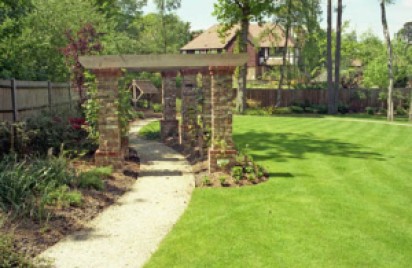
Paths should be at least 5ft wide to allow a couple to walk side by side..although,in a garden this is often impractical.
This beautiful path leads all the way around the garden, making it a fabulous way to explore the differing views created.

This scented path uses camomile planted within the ‘p-shingle’.
We used old railway sleepers and camomile to create this pathway, the camomile grows and covers the widened joints. When you walk on the camomile a lovely scent rises up.

A more formal gravel path – this is a white limestone and approximately 4ft 6 inch wide – just wide enough for two people to stroll (promenade) around together
Here the path is dressed in graded white limestone, this creates a much more formal garden for the client.

The next is designed in a series of straight lines using a brick module.

Here a zig-zag brick path leads from one section of the garden to another Using stock bricks that compliment the house colours is a good way to ‘link’ a garden design to a house. Walking on a larger sized clean gravel, is both fun due to the noise and a safety feature as you can hear someone or something approaching.

Here we used a larger stone size to add that lovely crunching sound as you walk on the path 
Natural random rectangular stone leading to a bound gravel pathway.
Perhaps the most expensive form of path, the steps are laid in natural random rectangular stone, which is expensive to purchase and time consuming to lay..

Natural stone steps It was a hot day when they completed these steps….

Probably the best material for steps To finish with some of my favorite materials. I’ve always tried to use natural materials on projects as the colour does not fade with time, they are often long lasting – if laid correctly. They always look soft and blend in so well with the surroundings..but natural comes with a significant cost increase..
A quick word about patios, if you are using the patio for entertaining a normal table with four chairs requires an area of approximately 10ft 6 ins ( 3m) x 10ft 6 ins (3m) to accommodate the table and chairs.

Laying small unit sett paving of almost random size in a radiating pattern requires skill and patience…. Do send us a comment or a request
Views: 54
-
The right-sized Flower Garden
Kerry Mendez has a passion for gardening, in her latest book “The right-sized Flower Garden” she discusses how to develop a garden that you can manage, often this will reduce the amount of work involved. As she explains it’s all … Continue reading
Podcast: Play in new window | Download
Subscribe: RSS
Views: 79
-
Hello world!
Growing Trends is about people, people who are passionate about their environment, their gardens & landscapes and the experts who help them.
Ann & Chris bring together interesting topics on the environment, gardening and landscaping then discuss them with fascinating people from around the world
February's & March's programs
We are concentrating on sustainability, with our second interview with Bill Sosinsky, then a fascinating series of interviews with Rich Sapienza discussing , solar power, fracking , food production, simple solutions to growing environmental issues.
We will also include some interviews with authors of some really interesting books – you can see who on our Book Review pages on www.grotrends.com
We welcome comments and suggestions… just drop us a line at info@grotrends.com
Views: 62
-
Growing Trends is listened to in 48 countries, our new program is all about people like you, from all over the world.
We would like to hear from you with ideas, comments and suggestions for our shows drop us a line at chris@chriscoope.com
We have been making changes to Growing Trends our internet based radio show, which we started back in 2015

Time to Eat – All about growing Herbs & Vegetables
Gardenesque – Everything to do with Gardens & Landscapes
World Wide Wesponsibility – A more serious look at sustainability and how we might all help our planet.
Face Time – Interviews with experts on topics of interest
Book Reviews – Interviews with authors of books relating to the environment, nature and garden landscaping.
Perhaps we could interview you for our Face Time segment? …. just drop us a line and we will contact you.
Views: 172
- Edibles, Food, Gardening, gardens, Healthy Living, Home & Garden, Landscape design, Landscapes & Gardens, Nature, park, Vegetable Growing
What do our kids really know about plants?
I was reading an interesting article the other day, it was discussing what today’s children know about plants.
The part that caused me to sit up and wonder was this line.. “Today’s children can identify about 1000 company logos but only identify 10 plants outside”
I wonder how accurate this statement is?
So a quick test – could you identify the plant below?
or perhaps this one.?
Thinking a little about it, brings to mind the simple realization that many children do not really understand where much of our food comes from.
We really need to change this for many reasons, perhaps our internet radio show, can help?

Listen at www.grotrends.com We want to engage ‘Granny Growers’ and introduce them to the ‘Growing Uppers’ , to start this rolling we’re heading off to interview a few senior citizens in our retirement community, to ask them what they learned and how they think we can help our grand children.
if you have some ideas , we would love to hear from you to… just drop us a line
Views: 108






